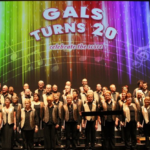Intro: A successful Gay Games extravaganza was mounted in Cologne in August 2010 with tens of thousands of visitors joining more thousands of native LGBT German citizens in this beautiful and ancient city on the Rhine River. For a week the city was filled with 25 different kinds sports and hundreds of competitions. There was also a companion cultural festival and the usual parties. Gay life in Cologne is second to none in Germany or the world, as testified by long-term couples who live there.
By Richard Ammon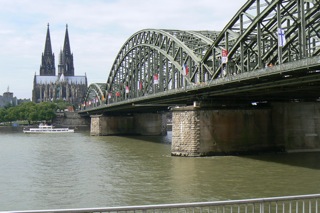
GlobalGayz.com
August 2010
Also see Gay Germany News and Reports
Also see Gay Germany Photo Galleries
At the Gala Musical Concert on Thursday August 5 2010, as part of the week-long Gay Games sports and culture festival in Cologne, the Rainbow Orchestra played a variety of musical and choral pieces including an excerpt from Aaron Copland’s ‘The Tender Land’. The music was soft, embracing and intimate–a fitting piece to include in this week’s musical events and in this ‘gay-tender’ city.
Life in ancient Germanic Cologne on the Rhine, with about one million people, is about as good as can be promised anywhere for LGBT people. When asked what’s the worst thing about being gay here, Marlon Berkigt, the PR director of AIDS-Hilfe in Cologne, said, "there is no worst thing about gay life here. We live life as normal people. We have the same concerns and interests and ideas as anyone else, ja, for the most part…" Gay partners can be legally registered in Germany. There are anti-discrimination laws, equal protection laws; homophobia is a legal offense and gay bashing is rare in the major cities of the country. Despite some resistance gay life is valued in Germany.
Anyway Gay Youth Center
The goodness of life here extends not just to adults. Around the corner from Friesenplatz with its outdoor cafes, restaurants, shops and chic high-rise building by British architect Norman Foster, there is quiet place that is specially open for LGBT youth, from 12-25 years of age. ‘Anyway‘ is a cafe-center-office-library-quiet space and hangout for questioning (or not) children who are becoming gay adults–beginning at 12 when many young people begin to realize they are different from their peers but can’t articulate or share this personal secret.
At Anyway (photo below) homosexuality is open, shared and validated. Anyway is publicly funded by Cologne city and the state of North Rhine-Westphalia and was the first such LGBT youth venue in Europe set up in 1998. Currently it’s the only center specifically for gay youth in Cologne (among 60 other centers for non-gay young people).
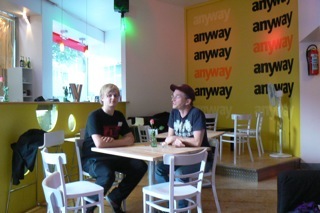 Thomas Haas, the director happened to be a the door when I walked in one day. He was cheerful and welcoming and showed me around with an offer of a soft drink. No alcohol is served. We were joined by Sean, a 19-year old blonde baby-faced volunteer (both men in photo left) one of 40 who help run Anyway along with 4 paid staff.
Thomas Haas, the director happened to be a the door when I walked in one day. He was cheerful and welcoming and showed me around with an offer of a soft drink. No alcohol is served. We were joined by Sean, a 19-year old blonde baby-faced volunteer (both men in photo left) one of 40 who help run Anyway along with 4 paid staff.
In addition to the cafe visitors can also access counseling, a theatre group, soccer team and social outings. Important issues such as coming out, relationships, HIV and safe sex and dealing with families are common concerns. There are four social workers affiliated with Anyway who offer private sessions when requested. As we talked a small group clustered around a guitar player and sang some fav tunes.
Most kids find out about Anyway through online sites such as gayromeo.com, funky boys.com, or DBNA.de and come to the cafe for companionship and information. Staff are trained to watch out for newcomers and make them feel welcome. Thomas, Sean and I then had a discussion about the merits and drawbacks of different kinds of cruising: looking only for a monogamous partner or playing the field–online, at the sauna, on the street, in clubs and discos, at one of the LGBT organizations or at Anyway.
Two former attendees of Anyway who ‘graduated’ when they became 26 met there and have been together for ten years. Sean is not looking for a partner yet and wants to explore gay life. He said he came out to his family at 15; his mother already suspected and his father was taken aback for a couple of weeks then came around, which, he said, is a common parental reaction in this area. He has only known three or four youths who have been rejected by their families. (However, he does not know any Muslim gay youth.)
Homeless youth who are alienated from their families can get housing assistance from the city and some financial assistance through the youth welfare office (Jugendamt). Others who experience homophobia in school can go to a designated teacher (vertraunslehrer–trusted teacher) who is trained to deal with abuse and discrimination. If there is evidence of abuse at home the teacher must report it to the Jugemdamt. For serious health issues Anyway refers kids to the public health service and to gay friendly or gay doctors and nurses.
The Bigger Scene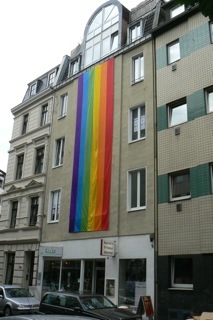
Cologne is a major LGBT ‘capital’ in Europe. It has dozens of venues and groups that serve countless gay citizens. There is a huge Pride event in early July, several magazines, sports organizations, music societies and many other special interest groups including WomenPride, a 2-week festival open to all women including Cologne’s diverse lesbian population, from lipstick to leather.
There is also a yearly international German Bear Prideweek in November; Bartmanner Koln is the oldest bear association in the world, started in 1986. In February Germany celebrates ‘Karneval’ with festivities all over the country. In Cologne thousands of LGBT residents join in with their own contingents and costumes. There is a annual LGBT film festival that attracts people from all over Europe.
On December 1, World AIDS Day and on Gay Pride Day in July, remembrances are held in a park on the Rhine River where there is an AIDS memorial composed of street cobblestones (Marksmanngasse) with carved names and dates of birth and death. This year an additional pre-Games Raindow Memorial run-walk was held at the memorial on a section called the "Kaltes Eck" (cold corner) of the park. (See Games description below.)
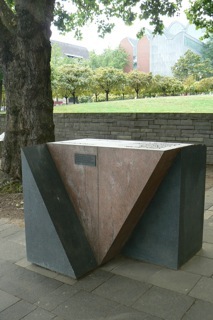 This touching ritual was held a short distance away from another poignant reminder of gay history. Facing east is a triangular carved marble monument dedicated to the LGBT victims of National Socialists (Nazis) in the 1930’s and 40s. (photo left) The inscription reads: "killed, silenced: to the gays and lesbians sacrificed by the National Socialists" Dedicated June 6, 1995, sponsored by the Magic Flute Gay Mens Chorus of Cologne.
This touching ritual was held a short distance away from another poignant reminder of gay history. Facing east is a triangular carved marble monument dedicated to the LGBT victims of National Socialists (Nazis) in the 1930’s and 40s. (photo left) The inscription reads: "killed, silenced: to the gays and lesbians sacrificed by the National Socialists" Dedicated June 6, 1995, sponsored by the Magic Flute Gay Mens Chorus of Cologne.
Another memorial, a small platz (plaza) near Lindenstrasse with trees and cafes, is named after Jean Claude Letist a Belgian-German gay man who’s was a pioneer gay right advocate as well as a founder of AIDSHilfe foundation. His life was cut short by AIDS at the age of 44, in 1990.
More lively aspects of the LGBT scene can be seen and heard at dozens of venues across the city. The heart of the scene (as well as much straight cafe life–the two lifestyles blend easily and often in Cologne) is Rudolfplatz, a beehive of social activity on weekends and after six on weekdays. Not far way is the Neumarkt and Heumarkt plazas with their own array of gay and straight haunts. In a special edition the ‘Out in Cologne‘ booklet published specially for the Gay Games, I counted at least 18 club-bar-disco places and events including the leading splash called the Colours party, an annual huge party that fills the Heumarket, Cologne’s largest outdoor square, with thousands of mostly bare-chested celebrants as part of Pride weekend.
Colours is one of the major events that happens on CSD Pride weekend (first weekend in July) on Saturday. The other two are the enormous Pride Parade on Sunday and the Cologne AIDS Gala on Friday. The amount of beer consumed over the weekend could float a ship but most people know how to manage their drinking and there is little trouble with a minimum of police presence.
Following Pride Weekend there is the WomenPride festival offering concerts, film, parties, pop artists performances, readings and lots of mixing. In February there is Karnival; in July there’s Pride weekend; in October the Beer Fest for everyone; and in November its the Bear festival. It’s hard to forget gay life in Cologne.
AIDS-Hilfe Cologne
For a break from the scene and some delicious food, the AIDS organization AIDS-Hilfe on Beethovenstrasse offers a big three-course midday meal in their Regenbogen (Rainbow) Cafe for the absurdly low cost of 4 euros. I could not consume all the food and neither could Martin, a Gay Games runner from Manchester, UK who joined me at my table. The cafe was started in 2000 to offer low income HIV people a place for a healthy, hearty and affordable meal. Indigent people can get the same meal for 2.5 euros.
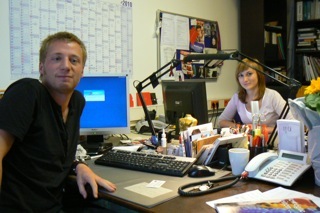 AIDS-Hilfe, like the big AIDS organization Terrence-Higgins Trust in London, is a full-service health and social service agency on five floors that offers comprehensive information and support to HIV affected and infected people as well as education outreach to schools and other agencies. Marlon Berkigt (photo right with Ursula Brechner) said there were 250 volunteers and 30 paid staff at AIDS-Hilfe. Their annual budget of 2 million euros comes from state and private sources in order to serve more than 200 regular clients and more than a hundred thousand overall contacts a year.
AIDS-Hilfe, like the big AIDS organization Terrence-Higgins Trust in London, is a full-service health and social service agency on five floors that offers comprehensive information and support to HIV affected and infected people as well as education outreach to schools and other agencies. Marlon Berkigt (photo right with Ursula Brechner) said there were 250 volunteers and 30 paid staff at AIDS-Hilfe. Their annual budget of 2 million euros comes from state and private sources in order to serve more than 200 regular clients and more than a hundred thousand overall contacts a year.
A major service is HIV testing and counseling and emotional support. When further medical care is needed they refer out to specialists. Unfortunately about 70% of new HIV infections are among men who have sex with men (MSM), said Marlon. Of that population most are over 40 years old who seem seduced by faulty thinking that because they are older they’re somehow less at risk or because of modern medications they see HIV as a manageable disease. So AIDS-Hilfe still has much work to do including outreach education to the gays bars and cruising scenes.
At Home: Andre and Gerhard
But life is not all music, drinking, illness, dancing and public festivities .
Gay life at home in Germany is ‘normal’. During the Gay Games I was hosted by a gay couple, Andre and Gerhard, who live in a modern bright cheerful and modestly stylish two bedroom apartment in the Friesenplatz area. Together for eleven years, they are originally from South Africa and have lived in Cologne for the past four years. Speaking fluent English, German and Africaans they are among the ‘professional’ class of residents here with sufficient income and assets to be called middle class. Andre (photo left) is a commercial architect and Gerhard (photo right) is a manager for T-Mobile phone company.
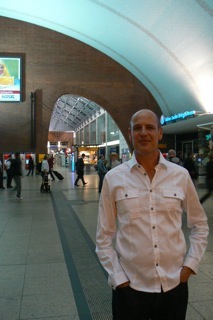 They deliberately chose to live outside South Africa because they wanted cultural and language diversity in their lives. When Gerhard was offered a job transfer they took the opportunity to move to Cologne. Part of their decision had to do with the quality and quantity of gay life in the city.
They deliberately chose to live outside South Africa because they wanted cultural and language diversity in their lives. When Gerhard was offered a job transfer they took the opportunity to move to Cologne. Part of their decision had to do with the quality and quantity of gay life in the city. 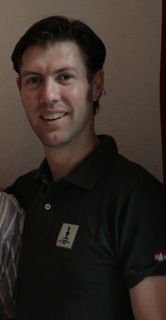
Nevertheless, most of their friends are non-gay people whom they have meet at work or though other friends. "We feel good enough about our identity and don’t have to surround ourselves only with other gay people. Oddly enough, straight people add diversity to our lives. We also like older friends, our age (38, 43) or older who are thoughtful and not much interested in the ‘action’ scene, although we have access to that if we want.
Just look where we live. You can walk for five minutes and there are bars, cafes, a sauna–and city cultural events. That’s why we chose this area of the city." They have never encountered any homophobic words or action. That was one of the reasons behind their move to Germany–the openness of gay life in Cologne. "But they don’t have the Miss Gay Soweto drag contest here, which we always enjoyed," noted Andre.
But not all was well at first. They didn’t have a community of friends; Andre as an independent architect did not come by clients easily; the long winter nights; adjusting to a new culture and learning the language was not always smooth;. "But it’s been worth it. South Africa is a ‘tenuous’ country and one can’t be assured that stability will hold given the great economic and racial issues. Germany is more consistent and stable we think."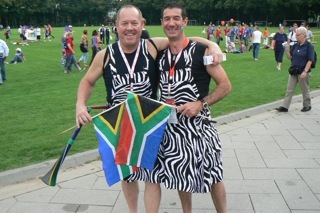 (photo right: South Africa Gay Games athletes)
(photo right: South Africa Gay Games athletes)
Currently they are looking to buy an apartment in central Cologne. The price is about 2-3000 euro per square meter, so a hundred square meters flat (just under 1100 square feet) will be around 250,000 euros (about $317,000). They plan to live in Cologne for the rest of their lives as far as they can tell for now, but would ideally like a home in both places since their families will continue to be in RSA.
The down side about being gay here? "I really can’t say there is a downside, as far as we are concerned. There is always the problem of AIDS and maintaining a decent income, but this not just for us. The only small issue here for gays is in the ethic outlying districts where there are immigrant populations that come from homophobic countries such as the MIddle East."
Heinz and Juergen
Perhaps a more representative gay German couple are Heinz and Juergen, 53 and 52 (photo below), who invited me to dinner one evening. Together for 27 years, since their late twenties, Heinz and Juergen are both native Germans having lived most of their lives in Cologne. They are friends of Andre and Gerhard and live a similar lifestyle in a stylish flat, which they have owned for ten years. Juergen is a professor at the University of Cologne (founded 1388) where he teaches German to foreigners who want to be more proficient in the language. Many of his students are business people with international dealings.
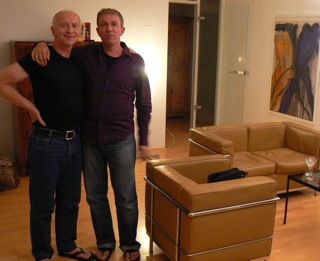 Heinz is a documentary film producer for German television, who also happens to have a PhD in physics. Their home is decorated with modern furnishings, has three bedrooms, two baths and a garden in the back. They are in a five-story apartment building with mostly straight couples and kids.
Heinz is a documentary film producer for German television, who also happens to have a PhD in physics. Their home is decorated with modern furnishings, has three bedrooms, two baths and a garden in the back. They are in a five-story apartment building with mostly straight couples and kids.
Their lives are comfortabgly stable after the usual ups and downs to achieve compatibility. Both are very fluent in English and are able to easily articulate abstract political and social ideas such as the potential threat to gays posed by the influx of Islamic immigrants into Germany over the past twenty years. This and the ever-present neo-Nazi mentality and anti-gay/anti-semitic skinheads are seen by Heinz as risks for the gay community, granted unlikely at the present time, but need to be watched in the coming generation.
Presently federal laws prohibit discrimination against "sexual orientation or gender identity" in employment. Other anti-discrimination laws apply in different states of Germany, and gays can serve in the military. (See description of LGBT rights in Germany.) But even such mild rights are resented by disenfranchised or under-employed people who feel gays are too protected and privileged. Heinz observed that some of the discontent comes from young people born into restrictive traditions such as Islam and other religiously conservative groups where conformity of mind and behavior to old ways are imposed on the modern young.
Many of those people now want to break free of this confinement and are angry not so much directly at gays but resentful of them since they appear as a liberated community and have lives free of inhibiting cultural or religious customs and practices. Heinz mentioned the recent book ‘Am Ende der Gedult’ (At The End of Patience) by German judge Kirsten Heisig, that analyzed the issues of this intergenerational conflict. The book was very controversial. Strangely and coincidentally, the author disappeared in mid-2010 and her body was found after an intensive search; her death was subsequently ruled a suicide.
(To add more drama surrounding this book, an Amazon.com book reviewer posted this comment after his review of the Heisig book was made public on Amazon: "I was threatened by diverse immigrants with the worst possible fate. From cutting my throat to shooting me down, it’s all there. I was told to delete my review or my residence would go up in flames". Amazon deleted the review.)
The ‘potential’ threat that infuses this issue may not be so remote after all. (See related report on Muslim youth.) Sebsequently a documentary was made (2010) shown on WDR (TV) about the growing problems, threat and homophobia that gay and lesbian young people have to face. It is titled "Schwule Sau“–Der neue Hass auf Homosexuelle‘ (‘Gay Pig–The New Hatred Toward Homosexuals’). Also see: Lamdba Youth in Germany.
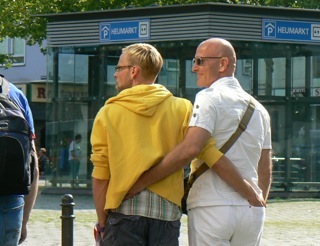 Less daunting conversation with Heinz and Juergen focused on the work still be done in Germany to gain full equal rights with heterosexual marriage. Legalized gay couples are called ‘partnerships’ (Eingetragene Lebenspartnerschaft), since August 2001, not marriage. They cannot adopt children as a couple, although one partner can as a single person. Commitment ceremonies vary from state to state: in Bavaria partnership only takes place in a private ceremony versus Cologne where civil partnership commitment ceremonies are held in the city hall (Rathaus).
Less daunting conversation with Heinz and Juergen focused on the work still be done in Germany to gain full equal rights with heterosexual marriage. Legalized gay couples are called ‘partnerships’ (Eingetragene Lebenspartnerschaft), since August 2001, not marriage. They cannot adopt children as a couple, although one partner can as a single person. Commitment ceremonies vary from state to state: in Bavaria partnership only takes place in a private ceremony versus Cologne where civil partnership commitment ceremonies are held in the city hall (Rathaus).
There are no automatic pension rights, no inheritance rights. However as I write this Germany’s Federal Constitutional Court announced this week (August 19, 2010) a ruling that registered homosexual life partners should receive the same inheritance rights as married spouses.
Heinz and Juergen see Cologne as their permanent home since the city is so gay affirmative and the LGBT events that happen there offer them all the ‘gay life’ they could want. I originally met them at a Gay Games Culture week concert in the city center. Afterwards we could have chosen any number of gay-owned or gay-friendly cafes for late night tea or beer but we chose not since I was competing in Gay Games swimming the next day.
During our dinner together, Juergen brought up another issue regarding being gay, that is, the subtle and probably unintended discrimination that comes from straight people who think marriage and children are the norm. He feels straight couples think gay couples are "selfish" by not wanting children, as if that is the sole purpose of marriage. But today gay and lesbian couples do find ways of having children–if they have the will.
Straight couples seem to judge, according to Juergen, childless gay couples as lacking something. However, Heinz offered that straight people are usually unable to get outside their own paradigm about what is a family. "They are stuck in their relationship being about children whereas gay couples often feel their relationships are about personal fulfillment. I agree–it’s not just an identity, it’s our destiny, to be more aware and more open to new ideas."
Cologne Gay Games
The Gay Games came to Cologne for good reasons: excellent facilities, good transportation, supportive city government, open LGBT scene, lively events and a national pro-gay attitude toward LGBT citizens symbolized by government sanctioned gay partnerships. Many sporting events were held at the large Sports University in the suburb of Mungersdorf, a short tram (U-Bahn) ride from city center–swimming, water polo, running, soccer, beach volleyball, basketball, body building, power lifting, table tennis and field hockey. (Also see figure skating video)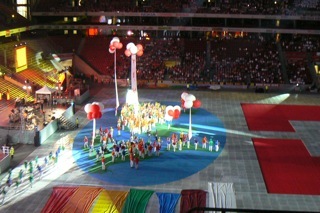
GlobalGayz writer Richard Ammon competed in swimming for the seventh time in the Games, since 1986 in San Francisco, thus the predominance of swimming photos of the Games. About 800 swimmers from 25 countries participated in hundreds of individual and team races that ranged from short 50-meter sprints, lasting 25-40 seconds, to the very lengthy 1500 meter freestyle races that took about 20 minutes per race to complete.
Overall there were 35 sports, including such diverse activities as ballroom dancing (see video) to shooting to billiards to bridge, at more than a dozen venues involving about 9000 athletes and thousands of generous local and foreign volunteers who offered their time for hours and days. As might be expected from a German host, the organization and functioning of the Games went mostly smoothly from opening to closing ceremonies.
As in previous Games, a centerpiece was the 275-page booklet given out to all participants containing descriptions of every sport and location as well as listings for all the cultural activities, parties, gathering places (‘villages), city tours.
A pre-Games AIDS Raindow Memorial run-walk was held in downtown Cologne sponsored by Frontrunners and its founder Brent Earl, assisted by German members of the Sisters of Perpetual Indulgence. They silently laid out a portion of the Names Quilt next to Cologne’s AIDS memorial cobblestones.
That night the Games opened with arousing cheers for 9000 athletes from dozens of countries as they marched into the huge RheinEnergies stadium in Cologne. (photo above right) Spirits were high, the torch was lit, the rainbow flag was raised and colorful lights splashed on the arena floor as hundreds of dancers, musicians, fire-dancers and celebrity singers entertained the crowd of about 25,000. Popular gay icon Taylor Dane sang her new song ‘Facing a MIracle‘, dedicated to the Gay Games. Swedish Idol winner Agnes Carlsson also filled the air with her singing.
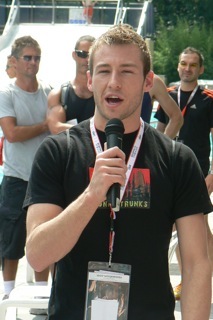
After welcoming speeches by the Games co-chairs Annette Wachter and Michael Lohaus and the mayor of Cologne, Jurgen Roters, the audience listened to choral and orchestral music including a rousing excerpt from Beethoven’s 9th symphony with its Ode to Joy. Matthew Mitchum (photo left), the openly gay Olympic gold medal diver from Australia, read aloud the traditional athletes’ pledge of inclusion, participation and personal best in the games including a commitment to respect and fair play.
But it was not all joyful celebration. There were two separate moments of silence, the first in remembrance of the young people who died recently at the Love Parade in Duisberg, Germany, where hundreds of young party-goers trapped in an access tunnel panicked and stampeded which crushed a dozen people to death. The entire Gay Games stadium went silent. A while later there was another silent remembrance, this one for people taken by AIDS.
Another joyless moment occurred when the German Foreign Minister, openly gay Guido Westerwelle, was introduced and walked to the podium accompanied by hooting and whistling from some Germans in the audience. Foreign participants in the audience were perplexed by the greeting. Despite the hazing the minister pushed on with his speech which acknowledged the Love Parade deaths and decried the persecution of LGBT people in repressive societies where religion is used to justify persecution and execution of gays: "No religion can ever justify murder! Killing and torturing minorities can not be justified by culture! This is not culture, this is exactly the opposite." The speech was powerful and brought a standing ovation from many (foreign) guests in the stadium.
In an interview the next day with GlobalGayz, native Cologne lesbian couple Kristin and Anya (photo right) and their friend Sybille spoke about the speech and the person of Minister Westerwelle and his reception. In their opinion, as a national politician he does not have an active history 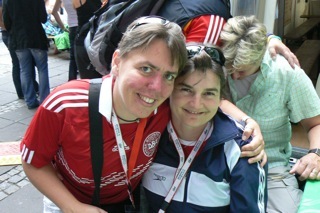 of advocating for pro-gay legislation and is a reluctant gay public figure. As a result many LGBT Germans feel he is not deeply committed to the LGBT community and only ‘riding the coat-tails’ of the movement that has powerfully emerged in recent years in Germany.
of advocating for pro-gay legislation and is a reluctant gay public figure. As a result many LGBT Germans feel he is not deeply committed to the LGBT community and only ‘riding the coat-tails’ of the movement that has powerfully emerged in recent years in Germany.
The three women also said he is disliked because of his libertarian social views. Many lesbians do not approve of his ideas against social programs (that benefit less privileged citizens). Many lesbians are not high wage earners and some need occasional help with medical care and social security benefits. "He has been an ‘absent’ member of our community and we don’t like that…and his political ideas make him unpopular. He sometimes stirs up problems because his lack of diplomacy in public appearances… We were surprised he was invited to speak and it was not unexpected that he would receive some disapproval. It was our way of letting him know about our opinion…"
Nevertheless, the next day the aggravation passed as athletes focused on their sports and cultural performances and less on politics. Across the city–except for sailing that was held in Roermond, Holland–thousands of participants began very different competitions, ranging from quiet bridge card playing and billiards to loud sports like shooting to hyper-active volleyball and intense swimming. Handsome Olympic gold-medalist openly gay diver Matthew Mitchum appeared at the swimming venue to give a pep talk and cheer on the swimmers. He got more than a few hugs before he left. Also appearing at swimming and several other sports was the American ambassador to Germany, Philip Murphy as a gesture of good will and the changing attitude toward LGBT people in the current Obama administration.
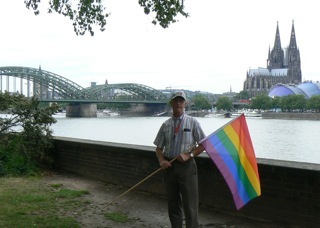 At the end of each day, medal winners could be seen walking around town in the bustling Rudolfplatz and Newmarkt plazas where music and food combined to create a carnival-like energized community spirit, especially at the WomenPlace venue where catered hot dishes, drinks, activities, flirting and talking combined into very supportive atmosphere.
At the end of each day, medal winners could be seen walking around town in the bustling Rudolfplatz and Newmarkt plazas where music and food combined to create a carnival-like energized community spirit, especially at the WomenPlace venue where catered hot dishes, drinks, activities, flirting and talking combined into very supportive atmosphere.
Cologne was the perfect host to the world’s biggest and proudest LGBT event. The next Gay Games will be in Cleveland, Ohio in 2014. (photo left GlobalGayz swimmer, Richard Ammon)




